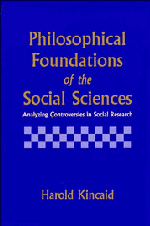Book contents
- Frontmatter
- Contents
- List of figures
- Acknowledgments
- Preface
- Chapter 1 Issues and arguments
- Chapter 2 Challenges to scientific rationality
- Chapter 3 Causes, confirmation, and explanation
- Chapter 4 Functionalism defended
- Chapter 5 The failures of individualism
- Chapter 6 A science of interpretation?
- Chapter 7 Economics: a test case
- Chapter 8 Problems and prospects
- References
- Index
Chapter 7 - Economics: a test case
Published online by Cambridge University Press: 05 June 2012
- Frontmatter
- Contents
- List of figures
- Acknowledgments
- Preface
- Chapter 1 Issues and arguments
- Chapter 2 Challenges to scientific rationality
- Chapter 3 Causes, confirmation, and explanation
- Chapter 4 Functionalism defended
- Chapter 5 The failures of individualism
- Chapter 6 A science of interpretation?
- Chapter 7 Economics: a test case
- Chapter 8 Problems and prospects
- References
- Index
Summary
Economics presents an important test case for the claims of this book. Modern economics raises doubts about naturalism because of both its failures and its successes. Its successes come from its sophisticated use of mathematics, making it the social science closest in form to natural sciences like physics. Yet to many, economics seems a dubious science at best, for its models are based on highly unrealistic assumptions and a priori theorizing. So if the best of the social sciences is suspect, naturalism is threatened. Economics also challenges the holism defended in Chapter 5. Methodological individualism is the official philosophy of mainstream economics. Its most powerful models seem to work by describing laws of individual behavior and deducing aggregate social phenomena from them. Here individualism appears to get its strongest support.
This chapter makes a prima facie case that economics is no threat to either holism or naturalism. The discussion proceeds as follows. Section 7.1 sets the background. I outline some standard views about neo-classical economics and discuss their specific inadequacies. Most of these views err in treating modern economics as a seamless whole that stands or falls together. Section 7.2 rejects that assumption, arguing that the laws of aggregate market supply and demand are relatively well confirmed – and are independent of the highly unrealistic models of abstract equilibrium theory.
- Type
- Chapter
- Information
- Philosophical Foundations of the Social SciencesAnalyzing Controversies in Social Research, pp. 222 - 257Publisher: Cambridge University PressPrint publication year: 1995

